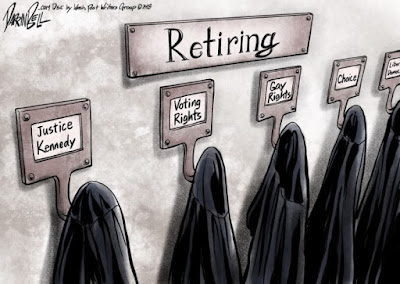Kennedy, who was appointed to the bench by President Ronald Reagan, was long rumored as a potential retiree -- although when he didn't announce that retirement at the close of the court's session on Wednesday morning there was some sense that perhaps all of the whispers about his future plans had been wrong.
But at 81 years old, Kennedy decided now was the right time to say goodbye. "It has been the greatest honor and privilege to serve our nation in the federal judiciary for 43 years, 30 of those years on the Supreme Court," he wrote in a letter to Trump informing the President of his decision.
It's almost impossible to calculate the impact Kennedy's retirement will have on the court and the country.

The thinking among judicial watchers is that Kennedy's retirement affords Trump the chance to appoint a more consistently conservative justice in his place and, in so doing, create a very clear conservative majority consisting of Chief Justice John Roberts, Clarence Thomas, Samuel Alito, Neil Gorsuch and whoever Trump picks for the Kennedy slot.
As The Washington Post's Supreme Court reporter
Robert Barnes points out, Thomas, at 70 years old, is now the oldest of the conservative justices. Ruth Bader Ginsburg and Stephen Breyer, both reliable liberals on the court, are 85 and 79 respectively.
It's also difficult to overstate how important the possibility of multiple Supreme Court openings was to the grudging acceptance of Trump's candidacy by a Republican establishment that worried, at least initially, that his nomination could destroy their party for years (and maybe even decades) to come.
As Trump continued to win primaries throughout that spring, doubts still lingered among Republicans about his ability to credibly challenge Hillary Clinton and, if elected, do the job of president.
In explaining himself at the time, Trump acknowledged that "a lot of people are very worried that if I got in I would put in the wrong judges. I am going to put in the right judges. I am going to put in conservative judges."
On Wednesday, shortly after the Kennedy news broke, Trump echoed that idea: "When I was running I put down a list of 20 people. Not being a politician, people wanted to hear what my choices may be."
It worked. In conversation after conversation with Republican elected officials and strategists between May and November 2016, the justification always cited for backing Trump -- albeit, in many cases, reluctantly -- was that he would put conservative justices on the bench while Clinton would not. If there was a catalyst for Republicans to throw their lots in with Trump, it was the idea that he might have a chance to remake the Supreme Court in a more conservative image -- even if he was in office only for four years.
When Trump nominated Gorsuch in February 2017 -- almost a year to the date of Scalia's death -- the bet those Republicans had placed on Trump paid off -- hugely. Gorsuch was regarded and has voted as a reliable conservative, helping to maintain the court's ideological makeup.
"When the official announcement came, it was exactly what every conservative who voted for Trump despite their doubts about him had dreamed of: a true conservative justice with the sort of pedigree (Harvard, Oxford) that will make it tough for Democrats to stand in unified opposition to the pick."
Gorsuch, in truth, would have been enough for lots of Republicans to justify their support for the kind of, sort of Republican Trump. Only in their wildest dreams would they have considered the possibility that Trump would get an opportunity like this one -- not only to nominate another Supreme Court justice but to replace the man who had been a swing vote for decades on the court.
That dream scenario came true on Wednesday afternoon.
And Trump was clear in his comments after the Kennedy bombshell that he would be picking a name from the list he released in fall 2016.
"We have a very excellent list of great, talented, highly educated, highly intelligent, hopefully tremendous people," Trump said. "I think you see the kind of quality that we're looking at when we look at that list."
Source: CNN, Chris Cillizza, CNN Editor-at-large, June 27, 2018
⚑ | Report an error, an omission, a typo; suggest a story or a new angle to an existing story; submit a piece, a comment; recommend a resource; contact the webmaster, contact us:
deathpenaltynews@gmail.com.
Opposed to Capital Punishment? Help us keep this blog up and running! DONATE!
"One is absolutely sickened, not by the crimes that the wicked have committed,
but by the punishments that the good have inflicted." -- Oscar Wilde















